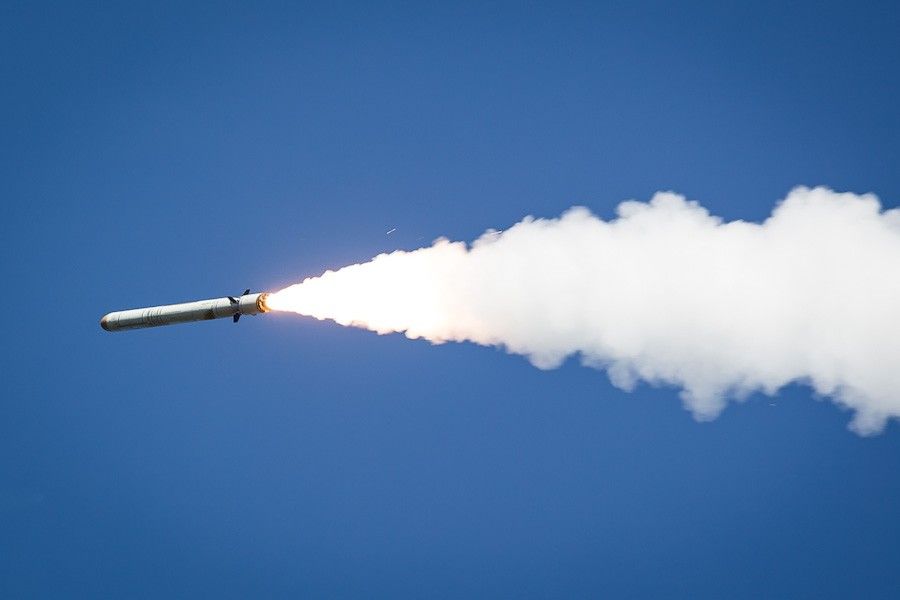
The Russian military in February was accused yet again of violating the 1987 Intermediate Range Forces Treaty, which eliminated U.S. and Soviet missiles with ranges of 500 to 5,500 kilometers, by deploying a battalion of banned weapons on Europe's periphery. The Obama administration first reported in 2014 Russia had tested the banned missile, POLITICO wrote.
Leading Republican hawks are pushing legislation to compel Trump to take steps to develop new missiles in response — the first steps to jettisoning what is known as the INF treaty, signed by President Ronald Reagan and Soviet leader Mihkail Gorbachev. Rep. Mike Rogers of Alabama, who chairs a key oversight panel on nuclear weapons, told POLITICO he thinks it is "irresponsible for us to continue to adhere to a treaty when the only other participant has long moved on from it."
But there are serious questions inside the Pentagon, State Department and the White House National Security Council — and loud warnings from the architects of the pact — about the consequences of such a move, which some say could spark a full-blown arms race.
Spokespeople for the Defense and State Departments told POLITICO the INF Treaty remains "in the national security interest of the United States" and called on Russia to return to full compliance. The Pentagon, in a previously unpublished report to Congress last year, explicitly cautions against pulling out of the treaty, saying Russia's compliance "remains the preferable outcome, which argues against unilateral U.S. withdrawal from or abrogation of the INF Treaty at this time."
But as the Trump administration undertakes a review of the entire American nuclear posture, one focus is whether the U.S. should remain in the treaty. "There's a growing concrete threat that's being presented to us, to our forces, to our allies and friends … by this new system," Christopher Ford, senior director for weapons of mass destruction and counter-proliferation on the National Security Council, recently told the Carnegie Endowment for International Peace, referring to the prohibited Russian missiles. "We need to do more to ensure … that Russia doesn't obtain a military advantage from its violation."
However, many leading arms control advocates from both parties say that responding in kind could have even more dire consequences.
"It can only lead to greater danger," former Secretary of Defense William Perry, who is a member of the Pentagon's high-level Defense Policy Board, told POLITICO, noting that the type of weapon the treaty outlawed was considered particularly destabilizing.
"The chance of blundering into a nuclear conflict is greater [with such missiles] than with long- range missiles because they are not based on our shores," said Perry, who now runs an educational campaign on nuclear dangers in partnership with Stanford University's Hoover Institution.
More broadly, Perry said a U.S. move to pull out of the pact — even if it was not followed by a decision to match the Russian weapons — "means we are giving up on treaties."
It is a worry shared by veterans of Republican administrations as well.
"We are at an inflection point," said Ambassador Richard Burt, who served as the lead arms control negotiator during the administration of President George H.W. Bush and oversaw the deployment of the now-retired Pershing missile, the last intermediate-range nuclear launch system in the American arsenal, when he worked for Reagan. "The whole structure of the arms control regime is in danger of falling apart and we are going to find ourselves in a nuclear arms race. Before pulling out of the INF Treaty we need to take a deep breath."
The INF Treaty stands as a landmark in arms control not just because of the reductions it achieved — removing thousands of nuclear weapons from the European continent — but also because it for the first time eliminated a whole category of nuclear weapons.
"To some the zero option was impossibly visionary and unrealistic; to others merely a propaganda ploy," Reagan said at the treaty's signing. "Well, with patience, determination, and commitment, we've made this impossible vision a reality."
Russia has denied violating the treaty. In February, a spokesman for Russian President Vladimir Putin said Russia "remains committed to its international obligations, including under the INF Treaty."
But senior U.S. military and intelligence officials strongly disagree. Director of National Intelligence Dan Coats told the Senate Armed Services Committee last month that Russia likely developed the banned cruise missile in part because the INF Treaty does not prohibit U.S. allies from possessing such weapons.
"Moscow probably believes that the new [ground-launched cruise missile] provides sufficient military advantages that make it worth risking the political repercussions of violating the INF Treaty," Coats said.
Read alsoBuzzFeed: The Trump administration has a new plan for dealing with RussiaNow a growing number of Republican lawmakers and national security specialists are calling for the U.S. to deploy intermediate-range missiles in response — and tear up the treaty.
Sen. Tom Cotton (R-Ark.) introduced a bill this year that would declare Russia in material breach of the treaty — the first step to withdrawing.
"Declaring Russia in material breach of the treaty is an option the President should absolutely consider," a spokesperson for Cotton told POLITICO. "In the meantime, the United States needs to begin researching and developing similar systems."
The bill would also authorize transferring intermediate-range systems to allied countries, establish a new program for ground-launched missiles within the banned ranges, and provide $500 million to fund countervailing-strike options.
Those provisions are carefully designed to stay within the limits of the treaty but send a strong signal to Russia that it should come back into compliance, according to Tom Karako, the director of the Center for Strategic and International Studies' Missile Defense Project.

